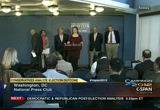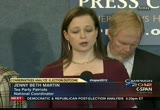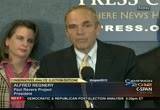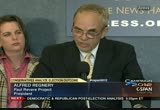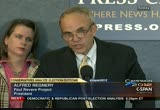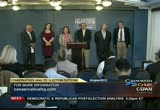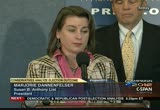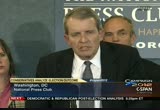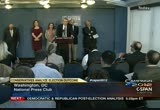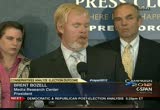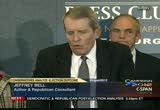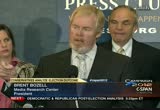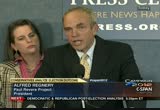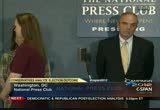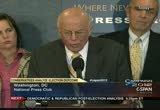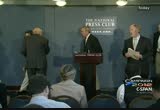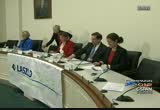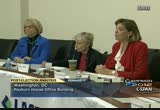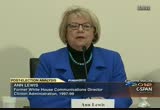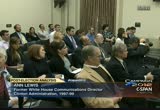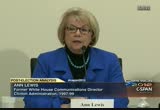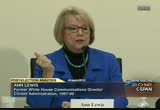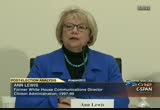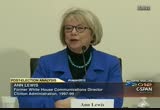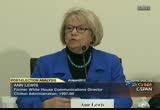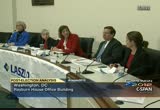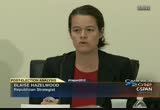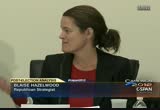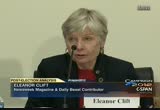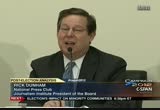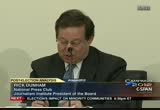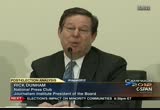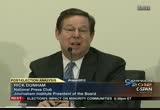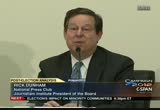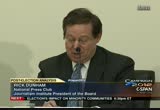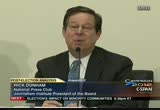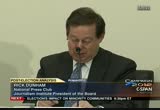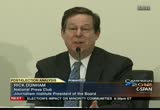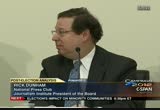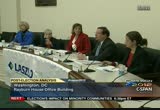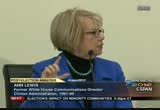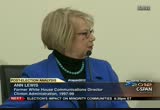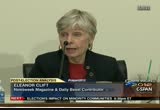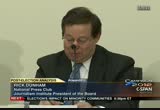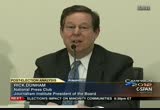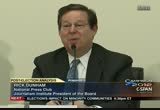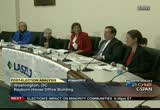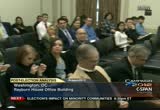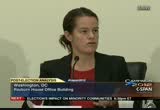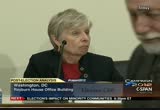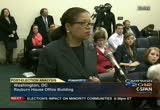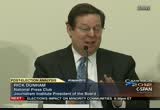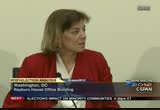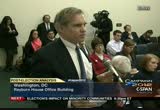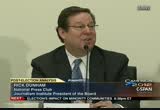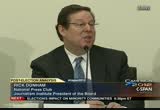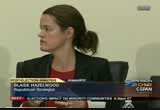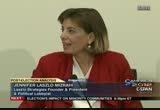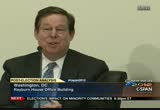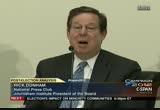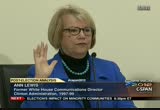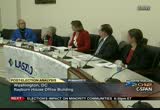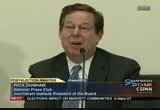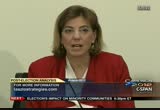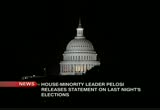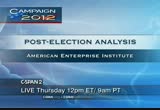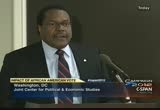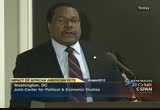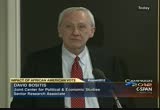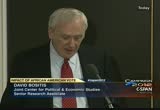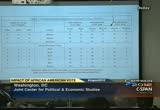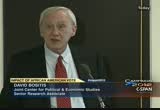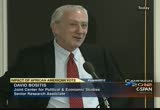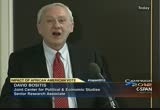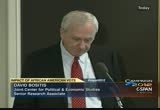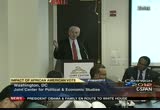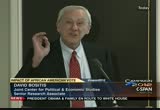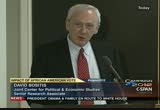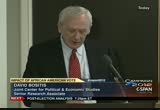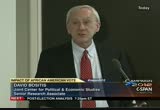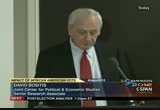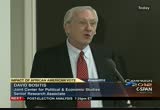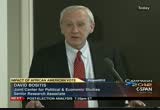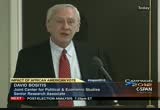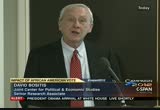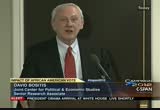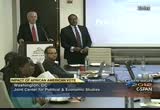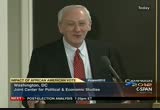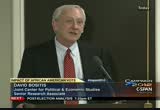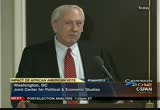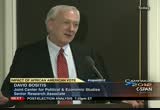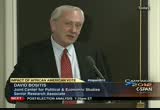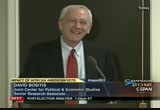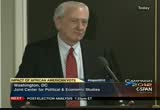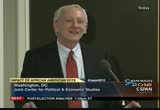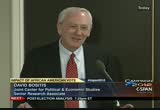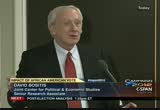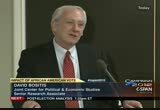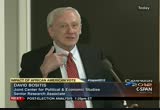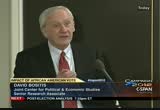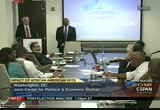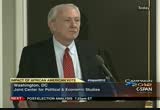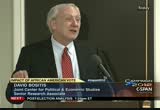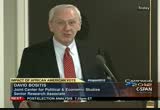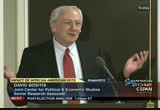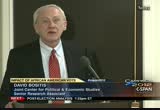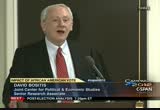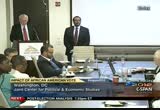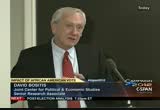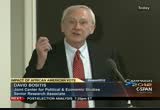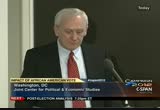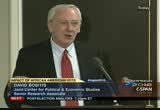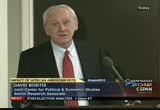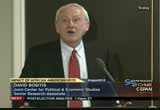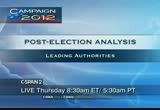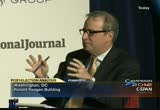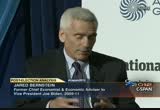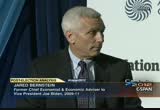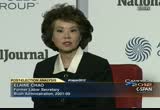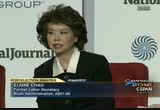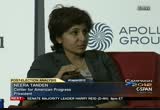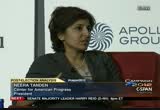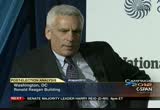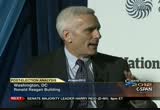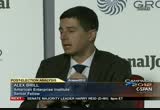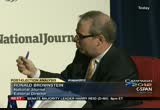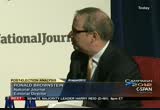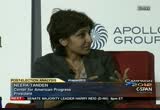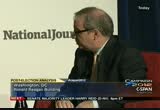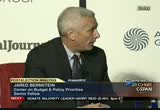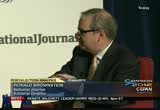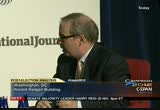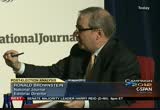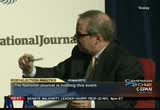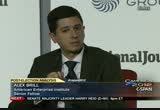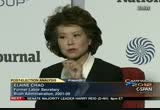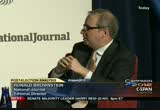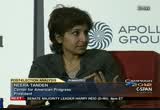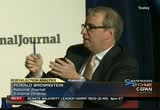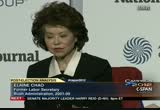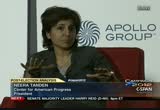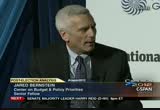tv Public Affairs CSPAN November 7, 2012 5:00pm-8:00pm EST
5:00 pm
closed. along the lines of what jeff just said. yesterday's election was an invitation to the republican party to return to the fundamentals. what are the fundamentals to winning strategy? of the policy stool. social policy, economic policy, and foreign policy, embracing each one of those. what we had was one wobbly leg. with $1 billion provided on the republican side. from the top of the ticket and affecting every other senate race in the country because of that influence. when fully engaged, each of those policy areas are mandated and created and there is a residence on the ground -- grass-roots level brings public policy leaders into office so those three areas can be implemented without fully engaging on aid to those areas
5:01 pm
and on social policy, we leave boats on the -- votes on the table every single time. we had a defect a truce on social issues on one side but the full embrace of the war on social issues on the other side. republicans had the truth, obama had launched a war over abortion. and on the life issue. and he got to define what that issue was and what is it? rape. abortion meant rape in the minds of many voters because the debate was not fully engaged. his weaknesses, his extreme positions on late term abortions, on sex selection abortion, not saving children born after a failed abortion, none of these were exploited in any debate.
5:02 pm
even the lies he put forward went unaddressed. the allies at planned parenthood does mammograms. the lie that hospitals that have religious tenets will not be forced to fund abortion inducing drugs and sterilization. voters disagreed with those extreme positions of the president and the democratic party. moving forward, the republican party and its candidates must expose and exploit those vulnerability is or risk alienating the tremendous and growing pro-life base that year after year election after election has delivered a winning in red. the war and women, was that the effective? did it most women voters? when you look at the data you have to say no. the gender gap that benefited obama decreased this election.
5:03 pm
after that launch of the war on women theme at the top of every single debate clearly did not stick. the women's vote was floyd. there were underestimated and in fact, completely underestimated. has the pro-life issue in any way been repudiated? absolutely not. i have been asked that question three times this morning. you cannot win a war which is not engaged. you cannot be repudiated, your issue cannot be repudiated if no one has ever heard it. that is what happened on the national will and some of the votes were left on the table. were going to look at how
5:04 pm
read -- endorse and train candidates. there will not be in the field without our support -- and to exploit the other extremes. next time we will see a new set of debts. one other point. social issues, are they the big burden on republican backs? if you look at every state that had a statewide race that also have ballot initiatives, every single and every single state but one, the ballot initiatives ran better than the losing republican candidates. that is just data. thank you very much and i look forward to questions. >> thank you.
5:05 pm
for those who believe that america is founded is the greatest country in the history of the world, we wanted someone who would fight for us. we wanted a fighter like ronald reagan who boldly championed america opposing founding principles who inspired millions of independence and reagan democrats to join us and who fought his leftist opponents on the -- idea that america was a shining city upon a hill. what we got was a week moderate candidate handpicked by the beltway elite and country club establishment wing of the republican party. the presidential loss is unequivocally on them. with a catastrophic loss, the tea party is the last best hope
5:06 pm
america has to restore her founding principles. while it may take longer to restore with president, back in office we're not going away. it took nearly 100 years to take america to the place where we are today. it will take more than 3 1/2 years to restore our constitution. we're going to keep fighting. we respect the constitution and we now that for america to succeed, we need to continue educating americans on our core principles. on the importance of the constitution. and why our solution is essential for america's greatness. when we fight for our principles, we win. our work begins today. county by county, district by
5:07 pm
district, we will fight for freedom the way others in america have fought for freedom in the past. we turn our attention to local and state governments and congress to fight the battles that lie ahead including balancing the budget, repealing obamacare, cutting the debt, holding the line on the debt ceiling, some things are worked -- worth fighting for. our constitution is worth fighting for. america is worth fighting for. we will continue to fight. >> thank you. grover norquist had a conflict at the last minute and will not able to join us. next we will hear from the president of the park project. , cuba. the project is a media project
5:08 pm
that works with 100 conservative organizations across the country to help us get a consistent message. what i want to tell the conservative movement is that like we have done before over the past 50 years, is to to principles. the conservative principles are those that have been mentioned several times so far this afternoon. freedom of course and a free economy and strong national security, traditional values, the rule of law, and adherence to the constitution. those are the things that the conservative movement was built on starting in nearly 50's. it is the things that keep coming back and i should tell the conservative movement that elections come and go. there was loss for all sorts of reasons. the election will be analyzed, it is being analyzed already. constantly as to why people voted the way they did and they're all sorts of reasons.
5:09 pm
it is the principles that in thatatives believe will keep it going. the conservative movement is not going away. a couple of things need to be done is the conservative needs to and will adopt a unified plan of projects that need to be stuck to, it is called no excuses and it will be released within the next week. that will be things some of which branch mentioned in his statement. things like their tax increases, no earmarks, defunding obamacare, keeping the defense strong. what the purpose of that is to
5:10 pm
hold the leadership's feet to the fire. there is little satisfaction with the republican leadership in the house and what no excuses will be designed to do is to give conservatives in the house a list of things which they can go to the leadership and say no more excuses, we will not hear anything that you have to say as they have done but get these things done. the other thing is the conservative movement needs to look ahead. we will look at this election and figure out why things happened the way they did but it is time to put mitt romney in the rearview mirror and proceed. there is a long bench on the republican side, many others of home -- who will be there to be the candidate.
5:11 pm
we need a clear view of where we're going. in 2014 there is as bright a view of the senate takeover by republicans as any time in the last 30 or 40 years. the number of republican scifres up for election as opposed to the democrats after two more years of a, -- obama, if republicans can take back the senate, they will make the last two years of the obama administration immeasurable time for the president. those are few of the things we look forward -- those are a few of the things. we look forward to taking your questions. >> thank you. >> this is one of the examples -- can you give examples of how
5:12 pm
mitt romney could have complained and the regret -- [inaudible] i do not think there's any question he took all the right stance. that is not the argument he took all the right positions and we were all happy to spread those commitments around. the problem was not communicating on a national stage with obama what his positions were. and when he was attacked, he led the attacks stick. an attack 6 unless you repudiated in some way. i would say that if not nationalizing the issue was the problem. we were happy to endorse him when the time came.
5:13 pm
we assume that he would make it more of a national issue. >> i agree. it is important for the -- the nominee to have conservative positions on social issues but if he does not defend those positions in a presidential debate, it is a problem because then the voters hear one side of it. example is when governor romney was going down a list of flaws in obamacare he did not mention the hhs mandate. if it had been better known, it would have hurt obama.
5:14 pm
it is one thing to know voters do not like the mandate. i agree. it was not a matter of the positions he took. it was his failure to elevate them when it seemed appropriate in terms of the natural flow of debates in campaigning. [inaudible] a lot of hispanic families share the values that killed reelection. should they push an immigration
5:15 pm
bill with some kind of amnesty provision [inaudible] >> i believe the republicans in congress should get involved in comprehensive immigration reform. not amnesty in the sense that all is forgiven and go directly to citizenship but doing something for the 11 million people who are here illegally, it is a threshold issue. if they think the republican party is now welcoming toward them, it is hard to get their attention on anything else. i would also argue that social issues, they are among the most pro-family, pro-work voting strength in the population and the failure to use those issues and try to win over hispanic motorhome was a major ally in the republican effort in 2012.
5:16 pm
>> you answer it when you said hispanic family values. the answer is hispanic family values. i was -- we were all struck after the 2008 election when the republican leadership told us that there were two things that had to happen. there needed to be outreach to hispanics and blacks and republicans had to get away from the social issues. if you look at the only thing, it was the marriage amendment in california. if you look at why it won, it was a crossover of hispanics and black pastors and joined the republicans. rather than look at hispanics and blacks from the standpoint of what we white people want to look at, why not ask them what they're -- they're interested in? wynola get their values and
5:17 pm
their cultural agenda and their priorities and address that? that is where there is great common ground and i do not understand why republicans seemingly are afraid of their own shadow and. when it comes to that. >> in the first national election, president obama embraced gay marriage. [inaudible] is this a losing issue going forward for conservatives? >> this is an issue that is free much under debate. you're right. there were four blue stage yesterday that approved gay marriage. most of them by very narrow margins. there were far less margins in the state legislatures in some of those states. would-be disaster is is if the
5:18 pm
obama administration had used the judiciary to oppose a solution on all 50 states that involved making doma unconstitutional and cutting off a debate when the other side made gains there is a lot of victories in something that is so far unique to the northeast and the pacific coast as a popular base movement should then be imposed on the midwest, the south and every other part of the country, 30 -- 32 states voted to prohibit it. >> i take my hat off to the democrats for sally embracing the principles. became ready for flight and they did not back down one bit when i came to their perspective.
5:19 pm
or abortion. whawe're worthy republicans? -- where were the republicans? have republican showed up, maybe there would have been a difference. rex i want to say this, it is similar to why the republicans fight against health care bill failed. that was a failure to put resources, focus, and energy into working on each constituency that could have voted down the bill. the pro-life democrats being a great example. about $1 million out of the $80 million that was spent had been focused on that, maybe it would
5:20 pm
have voted differently and we would not be talking about obamacare today. >> i have two questions. the first is is there an acknowledgement that the demographics in this country, that is changing, there is a changing face of america, what do you do about that? what happens now that you have the fiscal cliff? you have this deadline, how does that change? does your approach change post- election now? >> there is definitely a demographic change. we all recognize that. there is a school of people that work in demographics who said that if romney had won this election it would be the last national election that a republican would win under the same rules and principles. if you look at the numbers and there was a zogby poll that came out this afternoon that shows where -- how those numbers have changed over the last two or four years and they are significant. republicans have to address that when -- one way or another.
5:21 pm
i had dinner with arthur davis who outlined what he thought and his points were significant in terms of what blacks and hispanics believe or what the one. it will be of long time before the wind. >> regarding the fiscal cliff, and the economic issues. what we saw last night were that the voters voted for the status quo which is gridlock. they did not see a clear distinction between either of the party so they went with what they now and what they know is what we have seen in the last two years, is a standstill. they continue to evaluate which direction they want to go and that is what we will see in the next few weeks and in the next few years we will see what we have seen in the last two years.
5:22 pm
curious whether you share ichard mourdock's view that [inaudible] >> that is something i feel very strongly. i to read this it seems like every day. if i have a home and want to sell for $200,000 and you want to buy it for $170,000, there is a compromise somewhere. if i want to buy your home for one letter sent thousand dollars and you do not want to sell it, i do not understand where the compromises. conservatives and tea party ears are a sick and tired of republican leaders at the national and state level of compromising with democrats which lead to the continual growth of government. why can we not compromise on how much we're going to reduce the size of government?
5:23 pm
that is a measure that we will hold the republican leaders feet to the fire on. we want compromise in reducing the size of government. we're sick and tired for the last 50 + years of seeing republican leaders compromised with democrats and pro the size of government. >> it is a simple formula. when a compromise in their direction they lose trade when a compromise in our direction we win. >> i have a good example. this president began his first term talking about common ground on abortion. he was sick and tired of what we're sick and tired of which is arguing about it all the time. there is no place in the gestation of a baby that is protected. that is the president's position. many points along the continuum. try to find some compromise to where he made clear, there is perfect clarity what his
5:24 pm
position is and that is there is no part in the continuum, not even after the baby is born. it became clear that compromise was talk for i am trying to bring your around to my point of view. >> the tea party is having [inaudible] again. it is the tea party dead or where is it going? >> three and a half years ago there were 22 of us. there was a poll three weeks ago, 40 million people would be voting based on the tea party principles and identify with us. from nothing four years ago to
5:25 pm
34 months later, 22 people to 40 million people. it is not the death of the tea party. ofre promoting our values fiscal responsibility and limiting permit -- government and free markets against campaigns that have been campaigning for the past six years. we're new, we're not going away, and we will continue to grow and get better. >> to put a finer point on that, i could not agree more. i feel that because of the tea party and the conservative movement working at the grass- roots level, all the way up to the republican presidential nominee in four years, within that time, the conservative movement tea party will take over the republican party within four years. there is one last question. if not, thank you for coming.
5:26 pm
... >> president obama and his family are returning to the washington area arriving outside of washington. thursday on washington journal with both chambers returning to washington next week, we will speak with our guest about what lies ahead and scott wilson. washington journal is life every morning at 7:00 a.m. eastern. analysts and the former director participated in a bipartisan panel examining the next steps for the president and congress hosted by laszlo strategies. this is over an hour. >> who loo>> good morning.
5:27 pm
welcome. i am founder and president of this organization which is laszlo strategies. it does strategic communication but we're not partisan and i am very honored and delighted to have a terrific set of panels to offer the audience today. we have to audiences, a live audience here, we are in the rayburn office building in a hearing room of the foreign affairs committee. i would like to thank congressman berman for his
5:28 pm
service. it is an incredible thing to have to serve or be willing to serve. it is a painful process to go through negative campaigning. i think the american voters odette of gratitude to all who are willing to serve whether they win or lose. i have picked a very distinguished panel of folks to talk today from left to right. to make it convenient for you i have ceded them in a way that i think is approximately from a left to right. on my right and you're left, i will start with our first speaker but the way i am going to do it is i will briefly introduce each speaker. i will ask them the same question which is about what happened in the election and what it means and they will spend five minutes. we will go on to the next speaker and we're going to have an opportunity to do a lot of q&a. this is going to be non-
5:29 pm
partisan. we have both political parties represented and a wide range of views. you'll hear the broad spectrum. i will start with ann lewis. she is a complete superstar in strategic communication. people know her as the former white house to indications director under president bill clinton and the shining light behind a political operation of hillary clinton. let me start with ann lewis. >> thank you. as to your question. >> what happened and what does it mean for america? i think by this hour while they're still counting votes in florida and made for the next week -- there is an even greener light. we know.what the president was reelected and
5:30 pm
democrats picked up seats in the senate which is contrary to what anybody in washington i think thought even as late as today. the house is going to stay roughly the same. absent breaking news, i bring you know prescind returns from florida. i would like to spend more time on why this has happened and what it means for us going forward. i share the admiration all around 4 president obama's campaign team. they were technically close to perfect in the first responsibility of a campaign team, that is to identify and turn out voters. the planned it and executed it, and it every step of the way, they knew what votes they needed and went out and got them. they began before election day thinking favorable votes in states where they had put people on the ground to produce. take ileus appear --
5:31 pm
technically a superb operation. perhaps some people will think by the fourth or fifth visit -- it did work. the point i want to make beyond that, the technical aspect will get a lot of attention. i want to point out how much of this is policy based. these elections are about policy, not just about campaign techniques. an example is the ongoing principle that government can be a force for good. government is not always the enemy. the rescue of the auto industry, very important.
5:32 pm
the second policy that had direct electoral consequences was the decision to reach out to what we know. young people who had been brought to this country perhaps by their parents, did not have the appropriate papers for citizenship but who were here. there were americans in every way i wanted to build the future and there were hoping to go to call it. the president was the announcement of an executive decision to suspend deportation for young people in this category with the -- was a strong signal. he welcomed them to america. we see in the numbers, understood and appreciated. the third is around the question of women posey held. while the affordable care act may still be unpopular, the provisions around care for women, health care for women, no
5:33 pm
more gender discrimination, a series of preventive service like cancer screening, birth control, are very popular. to the extent that republicans beginning with their nominee made it an issue there were going to roll back these protections, these provisions, they said to a lot of women were not on your side. you had a symbolic way of saying to people we understand and we want to be helpful. the fourth piece i would say is the issue of marriage. in maryland, equal marriage. marriage should be open to everyone or who they love. i do not think we appreciate how important that issue is as the civil rights issue. when i look at use turn out and heavy margin that president
5:34 pm
obama got, a smaller clusters or chair. it may look to an outsider as if not much has changed. we have president obama and the democratic majority and the republican majority in the house but we look at the different people who have been elected to congress. look not just at their faces but their life experiences and and reflects the changes in america. we have a for your new women senators. we have six incumbents and five challengers and five new candidates for -- there were reelected. there were 33 senate seats up for election. one in three of the democratic
5:35 pm
nominees for women. this is a historic marker for a party and the voters liked it, too. new republicademocratic women. the growing number of women in the senate is gerrie important. reflected by the way the continuing number of women in the electorate in 2008, something like 10 million were women and they gave president obama a 13 point margin. i cannot say this morning with the turnout will be. women have given president obama a 12-point margin. you are doing pretty well. hang attention to the world of women voters in this one and the
5:36 pm
role of hispanic voters and the role of the young voters and their enthusiasm for the president and then go back and the the the policies which inspired this turn out and you have a better sense of what this election means. thank you. >> i will turn to the political right. i will turn it over to blaise hazelwood. she is the president of press returning which is that mike returning. then his the wood is one of the leading republican political consultants and good friends of mine and she is a working mother. a real testament to the world of women that this is the first panel i have done on politics where we have had so many of the panelists are women and nobody is here for from affirmative action. this is a superstar panel.
5:37 pm
what happened on the republican side? >> my husband and i were talking about this last night and the first thought that occurred to me is this is campaign 101. that is the bottom line. the way i look at it is the first thing is the democrats and i have to give the obama team great credit, they turned out their base and they did a fabulous job of it and there is a lot we need to learn from them. as republicans. the next thing is that-works. -- negative works. the team went in and defined romney early. romney was not given a chance and that works. the last one is you always have
5:38 pm
to rebut the negatives against you. again, it is a fundamental part of campaigning. the campaign with that summer go unanswered. let all those tax go unanswered. that was the problem. he was defiant. as you saw will look at the house, they did the exact opposite. once they knew there would be taxed, they went on the offensive immediately. and we are in the same place as the house. the house campaigns went negative early and the results are parent that that works. and so for the future, i look at this again, it is like a learning experience. this is 2004 all over again. the republicans are the one with the wake up call this time.
5:39 pm
the sides of change. we need to look back at this election and again review our turnout techniques and go from there. >> thank you. i will turn to eleanor clift. she is a contributor to newsweek magazine and the daily beast website and a regular panelist on the mclaughlin group. what happened from your perspective? >> my chair is lower than the two ladies. i am ten feet tall today. it was a good night for democrats, for women, for pot smokers, for the new emerging electorate. this was not your grandfather's
5:40 pm
electric. ronald reagan ran in a different america. ronald reagan would have a difficult time in today's republican primary process. i think there are lessons here on the republican side and the democratic side that they are not as technocratic as blaise is suggesting. those lessons can be learned very easily. it is the remaking of the party's approach if the republicans cannot be a national party if they turn off african- americans, hispanics, and women. the republican party is 90% white. the democratic party i understand, the caucus that returns to washington will be 50%, majority minority and women trade when we look at the state
5:41 pm
of the union next year, that divide is so apparent with republicans on one side and democrats on the other. the overwhelming white male list of the republican party comes through. i love white males, i gave birth to three of them. there are enough of them to keep the republican party alive. there are lessons here and the republican party will have to go through some rethinking and there are lessons here for president obama as well. he had a near-death experience after the first debate. he did see his political mortality. if there was a word, a fecklessness to the presidency that he is the celebrity and he can custom off i think that has been purged from him.
5:42 pm
he won in large part because of the auto bailout. opposition to it was overwhelming. he did it and it succeeded and it was cold and clear. we need more of those kinds of decisions and more of that leadership and i think he needs to be mindful that he has to tell his story along the way. however superb his campaign was, of the white house team was terrible in message making during most of his presidency. they lost control of the health- care debate, the tea party came in and filled that void and that cost them a house in 2010. it will be a long time before they get the house back because of redistricting and all that. that is the one sour note for democrats coming out of the election is what to do about the
5:43 pm
house and is there a way back to the majority? there is going to be some rethinking of their approach and their leadership. i would like to see the president named governor romney to some kind of post. the bully pulpit for business america. bolstering business. i think it would send the rest -- right message and i thought governor romney's speech was classy and that is probably who he is. he does not run alone. he runs with the party and i think he alone could not change his party even if he got elected. and so i would like to see governor romney have some sort of prominent role. there is bad blood between the man but there's a lot of gamesmanship in politics and if you are the winter you can
5:44 pm
afford to be generous. president-elect obama reached out to hillary clinton after a very bitter primary fight and get all the good that has come from that. that is my wish for the future. >> thank you. i will turn to rick dunham. he covers politics for hearst and is president of the board at the national press club of journalism institute. he is the past president of the press club. >> i have attended a lot of jennifer's sessions over the years, covering them. it is a special honor to be on the panel. and i can import enough wisdom here -- i hope i can impart enough wisdom here. in my new life as a webre writer, since all journalists are multimedia all the time, i like to do top 10 lists.
5:45 pm
i will do the top 62 ways from the election last night. for me. no. there is a demographic tidal wave and the republicans ignore it at their own peril. in the past four decades, the percentage of minority voters in the electorate has gone from 9% to 20%. if you had the same electric as we had in 2000, romney would have won yesterday. the same way four years ago if we had had the electric of 1988, john mccain would have defeated barack obama. the facts are there. if people turn out, if minority voters turn out, the republicans have a disadvantage to service.
5:46 pm
latino vote, it was huge. though you look at the states, you could argue iowa. state after state, the latino vote if you take it out, the democrats would have lost. even in florida with 61-39, that includes the cubans. cuban americans are no longer the majority in florida among latinos but also the younger generation of cuban americans are voting like dominican or puerto ricans. asian americans, that was the biggest shift. 75-25 for obama. bush actually won the asian- american votes. it was a swing vote leaning republican. yesterday was three to one
5:47 pm
democratic. urban-rural. it is 60-40 and demographically which areas are growing, the urban areas or rural america? you would not want to bet on rural america to be our population center going ahead. young and old, again, the youngest voters of the most probing, although i will say that the 18-21 voters are less pro-obama then the people slightly older than they are. the 21-30. which would you rather have, young voters to are going to be boaters for 60 or 70 years or people you are -- 21 when ronald reagan was elected who are now
5:48 pm
seniors? they're not the greatest generation and they're not the new deal rumsfeld democrats. the people who are going to be tomorrow's seniors are people like me and we're not your -- not the same kind of democrats as the greatest generation. republicans cannot be the party of older white men. and it is important to years ago. the republicans did quite well among women across the board. yesterday you saw the gender gap among women stayed the same as four years ago although men opened up and romney did a lot better among men than mccain did. born-again and evangelical protestants, if you look in virginia, that could have been the difference.
5:49 pm
the percentage of the voting population that was evangelical born-again protestants went down significantly over four years. and a lot of states are going to have to look at north carolina as more people who are not the old jesse helms born-again evangelicals protestants. south carolina and georgia, you may seek demographic changes there that could make the state's more competitive going ahead. i will be quick on the other takeaways. the polls right. there was a lot of debate about where the polls by as and legitimate debate about the methodology, the screens for likely voters and we get it right and as you are aware, a lot of people use of funds. and not land mines. polling is an art and science and they did a very good job by and large. almost every leading polling organization, a gallup was the allies' air but they were within
5:50 pm
the margin of error. that is a big take away. there is the myth of the undecided voter. all year long we had stories, who were the undecided voters? people who are parking themselves going one direction or another and depending which we it was, your definition of who is undecided change. the undecided voters were people who because obama was ahead in the polls so the people who said they were undecided are people who were dissatisfied with the economy, with obama's performance but there were not sold on romney. there were saying that was the undecided voter. those people were saying there were for romney and the people who were undecided are people who used before, but they did not like his performance so there were undecided. it is a myth of saying who is undecided. we're going to analyze it, we have to analyze it as persuad able voters.
5:51 pm
the way we analyze undecided voters is ridiculous. independents are no longer the swing group. romney won independence and in a lot of key battleground states, he carried the independent vote and lost. independents the way they define themselves now in this era of strong partisanship tends to lean slightly republican. if they split even or democrats when it, it is a good year for democrats. moderates lean democratic. moderates are also a key swing vote. we have to look at people who call themselves moderates and independents and somewhere in between or the combination is your swing electric. we dismissed moderates for years because people were saying leans democratic. we should dismiss demographics
5:53 pm
-- independence because they leaned democratic. the suburbs cannot be analyzed as a whole. you look nationally, romney won the suburbs by two points. look at northern virginia. it delivered -- the blue state suburbs, philadelphia whiteout romney. the suburbs also wiped out romney. new york, philadelphia, d.c., los angeles, san francisco, the suburbs were democratic. the suburbs were swing. suburbs of dallas, houston, san netanya, atlanta, charlotte, and south carolina ever -- were republican. analyzing by saying suburbs does not work. you have to look at each individual suburb or the region of the country. and we have to rethink the way we spend money in politics. if this was a $6 billion election-year with status quo results, the biggest success would -- when it comes to money and politics and i'm not talking about message should dismiss des -- macro, it may be an effective way to pay voters directly. should dismiss demographics -- independence because they leaned democratic. the suburbs cannot be analyzed as a whole. you look nationally, romney won the suburbs by two points. look at northern virginia. it delivered -- the blue state suburbs, philadelphia whiteout romney. the suburbs also wiped out romney. new york, philadelphia, d.c., los angeles, san francisco, the suburbs were democratic. the suburbs were swing. suburbs of dallas, houston, san netanya, atlanta, charlotte, and south carolina ever -- were republican. analyzing by saying suburbs does not work. you have to look at each individual suburb or the region of the country. and we have to rethink the way we spend money in politics. there is more returns for your
5:54 pm
investment. i would conclude by saying that the supreme court is the second most important institution in the united states in aiding the economic recovery because next to the feds, they have done more to pump more money, more stimulus into the economy in hard-hit states like nevada, florida, ohio, colorado, pennsylvania, california than any institution. they may be more important than the fed. we have to look at money and politics. >> this is interesting. the comments from all four speakers. i want to ask about a demographic group that none of you touched on. one out of every five americans has a disability. 51% of likely voters said they have a family member with a disability. at the national press club when there was an opportunity for the romney campaign and the obama campaign to send someone to speak about disability issues, the romney campaign chose not to attend and chose not to issue a position paper on disabilities. i wanted to ask why, given that one out of five americans has a disability, 51% of american likely voters has a family member or a loved one, why is there not more conversation
5:55 pm
about that demographic within our society and election process? >> the short answer is in an election that revolving around the role of government, if your for small government, why would you want to get into a conversation about how do you assist people with disabilities because it implies there is a role for government which might mean a program, which might mean money. it is not a conversation you want to engage before an election. >> think it becomes part of the mix of issues around caregiving which are directly important to women who are usually care givers. whether of children or the older members of the family, this falls to women. they see it as part of their role as care givers. disability is an issue. how do i meet my responsibilities, whether it is
5:56 pm
as a mother or daughter. when you talk to voters about their roles as care givers, whether it is the family medical leave act, which was one of the big successes of the clinton administration or the new affordable care act. now insurance companies cannot caps the amount of money that goes to someone because of illness. if you listen to president obama talk about the family whose daughter had leukemia, and because of the affordable care act, they will continue to get support for their child while otherwise it was about to run out. disability gets woven in to a set of issues that you could describe as the role of government but a more human way to say it is against -- again, how do we help each other meet those responsibilities? >> it is ever -- an opportunity for republicans that was lost
5:57 pm
this year. the way he tried to define himself as a different kind of republican and one of the ways was on education and he talked about the bigotry of float expectations. the republican who would deal with this drug they will try to figure out the role of government that could be helpful and also to talk about the private sector and the imperative for all americans to get together whether government is involved not. eleanor hit the nail on the head why america -- republicans did not talk about it. >> given the wounded warriors issue and other issues, do you agree that republicans do not know what to say on disability issues? when i think about disability advocates, i think of.
5:58 pm
sessions and tom ridge, the fact that the ada was passed by a republican administration. is there a reason there was not more done to target that constituency? >> i will go back to the campaign 101. you have to talk to people. the fact that they did not show up is a problem. that goes to the other demographic we're talking about. former president bush talked to uzbeks and we did not see that in this campaign. again i want to go back to that simple statement but i would like to take another step back. i think about the 49% nation. that is where we were in 2004 and everyone who says this is another 2004 election, it is. i remember walking around with
5:59 pm
of powerpoint encouraging people to turn out and the first page was a 49% asian. in it and after every election, every four years, there is the demise of what ever critical party and they will have to redefine themselves. again, i see it as 49%. >> we're going to take questions from the audience. this is how it is going to work. if you want to ask a question i will ask you to come to the microphone. it works better for c-span if people can hear what you're asking. if you're of a question, please make your way to the microphone. we would be happy to hear what is that is on your mind and i will ask that it be a question and not a statement so that we can be answering questions up here and not hearing political
6:00 pm
views and that you identify yourself when you,. if people are making their way up, i would like to ask about the future. we talked about what happened in the election but we have not hit on what does it mean? ann touched on this as did others. $6 billion was spent and a lot of time and energy and talent was spent on this campaign. at the end as six hours to stand in line and vote. at the end of this, we have the same house majority leader and same senate leader. what is that going to mean in terms of policy? >> the fact we have the same majority leader in the senate, and i'm very glad we do. harry reid is a great leader, but the fact is still majority leader does not mean there
6:01 pm
hasn't been a change. there has been a significant change in who people are. it's about their life experiences and what they bring to the table. and the fact that in the state of new hampshire, we have a woman governor and two women senators. we now have two women democratic members of congress. new hampshire is a pioneer in our politics in many ways. we all know that dick's will not cast the first boat and will be pioneers in this kind of representation. you talked about disability and i realize when i hear maggie talk about why she got interested in politics and what it meant for her, it starts with her having a disabled child. when we hear talk specifically about disability in my experience, it is often buy canned it or leaders who bring to the table this is my family and they build on this and see
6:02 pm
what can we do for everyone else? >> given the state of the economy, the expectation early on was mitt romney should win, would win, and he would bring a republican senate and we would have a unified, one-party control government. the fact that the democrats beat that back against a lot of opinion that suggested that was going to happen than the republicans said it was taken for granted until about two months ago when some of the republican candidates began to say things that put them outside of the mainstream and the democrats had some very good candidates. those races were decided individually. ishink ito's in washington
6:03 pm
very different. -- that ethos in washington is different. lessons have been learned from the force for years -- no more mr. nice guy. >> can you expand on that into the fiscal clip? -- fiscal cliff. i think -- >> i think it is all things to be determined. barack obama, as he reached out to republicans, starting with mitt romney and the leadership and key players he might be able to work with in a bipartisan way, say john mccain, there are house members and senators. does he reach out? second, legislation, does he govern from the senate out or
6:04 pm
does he -- from the center out or from the base over to get a majority? on the republican side, how will they react if he does reach out? i believe he will reach out but he doesn't realize with a fiscal cliff facing us that he has to do something. how do republicans respond? how does mitch mcconnell respond? i think the senate could come up with a deal in the white house. the question is and what happens in the house? there are two questions with john boehner -- is he temperamentally willing to go and legislate? but especially if he gets major concessions from the president? i think it might get the answer is yes. that leads to the second question -- can he bring his caucus along? a couple of the leading tea party members of the house republican majority were defeated, but that caucus is still as conservative as it was
6:05 pm
before last night. i don't know the answer, but we have issues that could really divide us -- emigration, where the president is going to move ahead very quickly. i say that 10 to one deal every republican candidate said they would not accept it, it may be four to one, but it will be a deal where republicans get 80 percent of what they want. can they say yes to 80%? the final one is the supreme court. what happens if justice scalia or justice kennedy retire? let's see what happens even if there is a mainstream nominee or what if president obama names the first asian american justice to the supreme court? what will the republicans do in that case? i wish i could give you the answers. i think we will see more
6:06 pm
bipartisanship but i think we will see a lot of bloodletting also. >> i have no idea what's going to happen because i don't think president obama told us what he plans to do. i'm very curious what he plans to do. he told us he is not mitt romney but he did not give us what he's going to do with the budget. a blueprint with what he tried to do with john boehner and his policies of these years he has to consolidate them? i don't buy the notion we have no idea what he's going to do. i think we have a pretty good idea. >> he did not tell us. >> what would you like him to stay? >> i would like him to tell us what he plans to do with the budget and how we're going to deal with the fiscal cliff. >> i think now we are in that time. we will see how he does that. i don't think mitt romney told us how he would deal with it
6:07 pm
either. >> i think you are right and we can agree on that. >> the model to me is health- care reform. barack obama never told us what he wanted. he never did what bill clinton did and put a proposal on the table. i think that's what we will see. as the president put out an emigration proposal or embrace simpson-bulls or does he try to bring everyone into the white house -- since then-bowles. we don't know the answer. either approach could work and be the one has risks. the first has more risk to the president as he put out plans that republicans cannot down. the second is more dangerous to the republican leadership that they cut a deal and cannot bring their followers a long. be a way is fine with me. >> are you surprised the issue
6:08 pm
of momism played such a small part in the campaign apparently? secondly, is not one conclusion that the republican party might draw that they need someone who is a standard bearer who is more publicly determined and committed to the precise base issues and will be more strongly committed in such a way so as not to move and shift positions during the course of the campaign? >> i go back to this being a 49% nation. the issues, but whether how strongly they were talked about is another issue. think thatessarily
6:09 pm
made a difference how conservative or how liberal because the based on each side is what it is. in terms of not talking about religion, i give the democrats and the democrat party credit because they did not use that in the campaign and it's something they could have done. i also give the romney campaign credit and romney himself for addressing his religion early on. it goes backed to campaign 101 -- rebut what you know or be on the forefront of what you know on the offense. that's how i would address it. >> i'm not surprised. i'm pleased more minutes and did not emerge as an issue.
6:10 pm
but it makes good sense -- americans don't like to see people attacked because of religion. we genuinely are proud of ourselves for being an inclusive and the worst country. that's what we like about ourselves. our country strong enough to include different forms of religion and it would have been a political mistake as well as a moral one. so i'm not surprised. the second piece is whether republicans would conclude if they would have been better with a canned it who did not wait until he was in the primaries to announce to was a fairly conservative. mitt romney, who i first met when he was a moderate, pro- choice governor of massachusetts and since then, he has made more you turns at a boston cabdriver. i think when you look at the results of this election and i think you can draw a direct
6:11 pm
connection between the policies president obama has let on and the voting support he got, if in the face of this, republicans decide what they need to do is go back and do it even more conservative again, far be it for me to persuade them otherwise. we have another election in four years. i could live with it but it would not be wise. >> on the religion question, i agree but if you look at the polling of people who said it would be less likely to vote for a candidate because they were more men, a majority of those people thought barack obama is a muslim born in kenya. it's just a demographic. it wasn't there to make it 8-. it is true democrats did not make it an issue and that the good thing. >> some of the positions romney took during the primaries really hurt him, particularly in regard to immigration reform. newt gingrich said mitt romney
6:12 pm
was the most conservative of the issue. in a country where that is the fastest growing block of voters, is not a good clinical position or moral position. romney did best when he moved to the center. he became a candidate in the debates and it was so late in the game and that base was so eager to defeat the president that they were willing to let him do anything he wanted. grover norquist who famously wed it doesn't matter who have and the white house, as long as he is republican and has 10 digits and consign our legislation, that is an example of a party controlling its candidate to the degree i don't recall in my lifetime. >> i don't often listen to talk
6:13 pm
radio, but this morning i felt gleeful and thought i would. i'm stunned at how many of the commentators this morning are digging their heels in on the right and just refuse to recognize that america has spoken by whatever margin. but this is my question -- is the shifting to it -- it is shifting demographic in that country, most of the seem to realize it, but i don't think the republicans have a sense that their base is shrinking and will be reduced to a regional political base if they don't embrace the fact that agents', latinos, any other group you can think of is part of this large mosaic now. i think the election in 14 will come before 16 but what will it take to get the republicans -- and i'm not in any great rush to do this, but to recognize the
6:14 pm
demographic shifted and they are not keeping pace with that change? >> the republicans are on the next panel coming up about 10 minutes. ralph reed will be here as will jim pinkerton. they will be talking about a lot of the republican issues. that panel have more republicans and democrats. the majority in the congress. the american people did speak. there still remains a gop majority in the congress. >> i will take one more to add to that. i want to confuse radio talk- show host with the country at large. radio talk-show hosts get and maintain their audience by being extreme. angrier, louder, the further out
6:15 pm
you are, the more you get people to listen. you have to say something different. they do not necessarily speak to the country and i think today, they don't speak for the congressional republican leadership, which really is looking at what are the best interests of their members and what is it they're going to do in the next two years so they can go back in 2014 as responsible members of congress. rush and the boys are going to whip up because that is there's schtick and as with they do. part of that is the great free enterprise system at work, not necessarily an electoral politics. >> since my first point and six takeaway, there is a truly demographic tidal wave and republicans ignored at their peril. i don't think the first thing republicans should do is change the course. they lost the --
6:16 pm
presidency, it still have power, but to me, is that the debate -- after the defeat of jimmy carter and walter mondale and michael dukakis, democrats had to talk about this and out of that came bill clinton and a different way of thinking. i think you can't say either romney did it wrong, we have to many conservatives and we need to be moderate, or romney lost because he's too moderate and we need somebody who is really conservative. we need to have a discussion of what you talked about, which is the demographic and cultural changes and how to best approach that. i think that is a process, not something you do right away. >> what does this question mean for the presidential candidates that are already running around? does that mean rubio has a
6:17 pm
better chance? >> you hear democrats looking at chris christie and think he would be a great candidate. republicans are thinking lookout of message he was and they don't like a number of things he has done. but i think somebody with appeal across the parties is what you want in a provincial candidate and someone who can with emotion defend where he is. i think chris christie is quite appealing. >> are there other questions? please come up to the microphone. did you have a question? >> you have touched on all of these point already but i'm wondering if he would be able to engage in some wednesday morning quarterbacking. analyze the romney campaign and answer the question could he
6:18 pm
have one? what could he have done differently? i have the to narrow -- i have the impression he was a little too narrow in his approach. it seems like he is reluctant and keeping his message very narrow. i just wonder if you were to serve as a consultant to the romney campaign what you would have done? also if you think over the next weeks and months his campaign is going to be viewed as a dismal affair because he didn't -- because he did -- a dismal failure because he did things wrong? >> it wants to take that? >> i will try to be quick but the dismal failure part will be of interest to people on the right -- i think it was about as dismal failure as john kerry. they're identical racers -- races and the difference between romney losing and bush
6:19 pm
winning with a demographic -- with a demographic shift from 2004 to 2012. looking at where the republicans go, i think the best way to approach it is to try to figure out -- how you deal with the key groups -- that he had been better among women? with the help of todd aikin and richard mourdock, his bearing to the right on immigration and his unwillingness to have a discussion with latino voters and with african-american voters, all of that talk about voter suppression or democrats
6:20 pm
trying to cheat just increased the turnout tremendously among african-american voters. >> two point -- one in the primary -- to in the primary and one in the general i really? the first would be the debate in which sitting next to rick perry, he moved strongly to rick perry's right on immigration and attack rick perry. someone never thought of as a squishy liberal and citing the dream back in texas. i thought he's going to live with that for a long time. it may have worked in the primaries but it has long-term consequences. the second was thing more than 12 is going to get rid of planned parenthood. this is a health-care provider and sent like one in four women at at one point or another gone to planned parenthood for basic health care. being on record saying that
6:21 pm
against that -- the worst that it consciously in the primary that or mistakes. the second is the one blaise referred to -- attacking his record at bain capital. he was running on his record as a businessman, so if you're going to run against him, he had . was the reason he was offering, but they went at it and at it and he did not respond. by the time they got to respond, there were a lot of that topped year and a lot l. scull and on. his responses could not be as powerful. -- with all lot going on. >> the analogy of the swift boat veterans for truth really eroded john kerry's appeal over the summer he did not respond. the obama campaign borrowed a
6:22 pm
page from that and ran all of those red -- ran all of those ads undermining romney's credentials. i thought that strategy was smart that time but at the first debate, it was almost too easy for romney to look reasonable and he shed that character. for a couple of weeks, it really did jumble the race. i think that was the one open eight romney had. >> i talked about the campaign 101 and one thing that was never clear, why romney, not obama? in terms of the need to talk to people, looking back into 2004 and president bush talking to hispanics, when our party does talk to hispanics, it works.
6:23 pm
there are lots of great examples. in speaking about 2016, one person i have a bias toward is a body jindal. he can articulate our conservative values and put them into practice. he put them and to practice in getting things done. i do think there is a great future and a lot of great leaders in the republican party who can articulate conservative policies. >> we have a terrific second panel coming up, but before we go to that, i see some of our speakers here. i want to ask if there were some standouts in terms of personalities or players in this race? i was very struck that cnn found
6:24 pm
its groove with john kean and the message board. if you were looking for any race, anywhere, you could find the information you were looking for. i was struck by margaret hoover , a political columnist who is so beautiful youth is so smart and every time she speaks, you think is she's smart. who are some of the people starting to blow you away or the institutions you thought played a major role? >> i would say going back to my original theory -- sasha eisenberg and his book, the victory lap, he nailed it. he was saying it before anyone else, that this was going to come down to turnout and techniques and so i give him a lot credit. might beraid this
6:25 pm
controversial, but i think nate silver, since this was the year of the polls, he nailed it. on the political side, having covered ted crews, i'm really impressed, and he's going to be a player. he could be a republican supreme court nominee if not a candidate for president or vice president. >> i don't think many people have heard that much about them. >> he becomes the third former supreme court clerk to be serving in the senate along with senators blow one ball and leigh. even the smartest politicians i've ever covered and one of the best debaters i've ever seen. you could tell he was a champion debater at princeton. he is very conservative. half irish, italian and human. he is the first hispanic as we would write in the texas media, the first hispanic senator from
6:26 pm
texas, but he has an obama ability to reach out. he can speak to hispanics and a very conservative way, but he can also reach out and conservative anglo republicans are very comfortable with them. >> i'm going to ask folks before their biggest turkeys. >> i just whispered that the castro brothers from texas are stars. one is in congress and one is a mayor. >> and people are going to say i loved your speech at the democratic convention. >> they are. >> i hope president obama reaches out to him quickly. i would give kudos to simon rosenberg, the new democrat
6:27 pm
network who has been researching and studying and telling us about the growing hispanic vote for a long time. he predicted 335 electoral votes and if florida comes in for president obama, i think he's just about right. it sounded a little outlandish a couple of days ago, so kudos to him. >> left and on a bipartisan note because i share the appreciation for the victory lap and i do recommend it. when i was canvassing in virginia, i was maybe the fourth person going around. i ask people whether they thought it would vote in the morning or the afternoon. i knew i was carrying out just what he recommended. you heard me talk about women candidates. i'm so excited about the women coming in. i would point to heidi who is going to be the senator from north dakota which does not come
6:28 pm
easy. but the hero in this unsung at the moment is emily's list, which exists to support women candidates in the house and senate and i suspect as one of the best when loss records of any of the organizations working in this cycle and the most effective use of resources. if you compare how much they raised and spent with the success of their candidates compared to some of the super pacs, they did a lot better with the money. >> who are the losers this cycle? >> the billionaires who handed over all that money and did not get much back for it. >> they got challis berkeley in nevada. >> that is unfortunate. they did not get what they thought they were buying.
6:29 pm
i would say the biggest loser is karl rove who appealed to a lot of people, a lot of people gave them -- gave him their money. fairy -- fairly bottom line series of decisions and a lot of money was spent. i like the line that ben bernanke was the second stimulus. i'm going to think of that when i see him. the supreme court is second only to the fed because by opening the door to that kind of private spending, the supreme court did a lot to the economy. but i've got to think as a look at their bottom line, it's going to be a disappointment. >> >> since indiana is too easy and alan west is too big a target, i'm going to michigan. he killed his own campaign on super bowl might when he ran the
6:30 pm
racist add with the chinese american actress and a race where the republicans might have been competitive into one of the cakewalk. >> i would say two things. who are talking about candidates, i would say joe biden is going to have a tough four years -- i will leave at that. on our side, i would say not continuing to learn, there was all lot of false security that we had in our turnout operation. we stalled and i say that's one of the biggest losers. >> this has been an utterly stimulating panel. when a second panel that's going to start a immediately. if you are on c-span and want to
6:31 pm
send comments, you can go to our web site and send in comments. i would love to hear what the viewers at home are thinking. let me say thank you to our panelists. thank you to the audience who was here and we're going to immediately go to our next panel. thank you very much. [applause] >> with his reelection not yet 24 hours old, the president returning to the washington area with his family at this hour to a joint base and trees just outside of washington. democratic leader did to pelosi releasing a statement just a short while ago saying in last night's election, house democrats surpassed historical trends and recent predictions, more than doubling the seats gained by president's party. she said in january, the
6:32 pm
democratic caucus will bring the first majority-minority caucus in our history, reflecting the great diversity and strength of our nation. this more diverse caucus will play great role in support of president obama and our colleagues in the statement. this statement was just released from nancy pelosi. we covered other statements that you will find them in our video library. tomorrow, we have live coverage of a number of post-election events. congressional quarterly roll- call is looking at the new congressional make-up and economic questions looming over congress at 10:15 eastern. getting under way tomorrow morning a political analyst, charlie cook, will break down election results and what the country's changing demographics mean for republicans. at noon eastern, more election
6:33 pm
analysis from michael barone. that is 12:00 on c-span2. next, and impact of the african- american vote and what the outcome means for minority communities in the u.s.. this is hosted by the joint center for political and economic studies. is just over 50 minutes. >> good morning and welcome. thank you for being here. i am the founder and president of this organization. it is an organization that has been a strategic communications but is not partisan. i am very honored and delighted
6:34 pm
to have a terrific set of panelists to -- to offer the audience today. we have to audiences today inside the capital area in a hearing room of the foreign affairs committee. i would like to thank -- >> this is the program we just showed you. we apologize for that. we do mean to show you the event for the joint center for political and economic studies. this is the one looking at the impact of the african-american vote this year. >> battleground states. analysts will continue to look at and interpret the results for some time to come, but i was struck last night by several things. the fact that the president was able to hold onto his vote totals from 2008 in a number of key battleground areas despite much speculation that he would be hurt by dampened enthusiasm among his 2008 supporters.
6:35 pm
second, by the rapid change in the demographics of some key states, particularly nevada and colorado and to some extent, virginia. not long ago, these were some of the rest of the red states, and we have watched through the election cycles of our population in these and other states shifting and changing and we see a number of significant changes in voting patterns. in 2008, president obama was swept into office with 97% of african-american votes and 43% of the white vote. today, we look forward to hearing from the senior research associate on his analysis on how these numbers faired in the 2012 elections and what it meant to the outcome we all watched last night and into the early morning
6:36 pm
hours. with that, let me call on the doctor for his analysis and remarks. that will be followed by questions from you. thank you very much. [applause] >> good afternoon. good afternoon. the 2012 elections are over and the elections were historic. there is one particular aspect of the elections that was historic that i would like to talk about first. it is not simply the reelection of the first african-american president. 2012 will be the last campaign where one of the major parties seeks to get elected solely with
6:37 pm
the white vote. is this on? 2012 was a clear showing that the country is now a multi- racial, multi-as that country and for a successful political party or a particle movement, they are going to have to appeal to a much broader swath than simply non-hispanic white people. the first thing i want to point out -- 2004, when john kerrey ran against george w. bush, the proportion of the electorate that was white, according to the exit polls, was 79%. 79 and everyone hundred voters were non-hispanic white.
6:38 pm
four years later, and in 2008, that number had declined to 74%. this year, that number declined to 72%. in the meantime, the african- american share of the vote over that time increased from 11 to 13. the hispanic share from six to 10. and the asian american share from one to three. we are experiencing serious demographic change. if you look at these different populations, the white population, the non-spec white population in the united states is a seat -- it aging. the median age is 42. that means half the white people in the united states are older than 42.
6:39 pm
the median age for the black population is 33. the median age for the hispanic population is 25. half the hispanic population in the united states right now is the younger than 25 years old. what does that mean? it would not mean anything if our politics and parties were not largely based upon race and class and ethnicity. right now, they are. the republican party and certainly their candidate this year, a former governor -- former gov. romney of massachusetts, pursued a strategy of only appealing to white votes, particularly white conservative votes. he was successful and so far as he defeated among white voters -- he defeated president obama,
6:40 pm
59% to 39%. he had 20% more than president obama received. in past elections, that would have been catastrophic for a cabinet in the united states. but despite the fact that president obama only received 39% of the white vote, he won the election 50% to 40%. he is about -- he has about 2.75 million more votes than governor romney. how did african-americans do? there are two aspects of the african-american voters want to talk about. it's not like there was truly a national campaign in 2012. if you lived in a swing state, you saw politics was all consuming. that was all that life was
6:41 pm
about, the 2012 election. on the other hand, if you did not live in a swing state, you probably were not entirely aware there was an election going on at all. in terms of the black vote, want to point out a couple of things. before i point out be increase in the black vote, want to mention one thing about gender. a major aspect of this election was about appeals to women, the phraseology was i believe "the war on women." there were issues having to do with rape, abortion, contraception, that were major elements of the campaign. there was a gender gap, and the gender gap was essential in terms of the outcome of the election. but i want to mention there was
6:42 pm
a recurrence of the black gender gap. there has for a long time been bought heavily talked about, but there has been a black gender gap in politics. in some elections, and has been as much as 10% points between how black men and black women voted. this year, 80 percent -- 87% of black men voted for president obama. but 96% of black women voted for president obama. of the 13% of the vote in 2012 that african-americans made up, 8 for women and five were men. the ratio of black men to black women in the election was five to eight. there were a lot more black women voting and black women were a lot more democratic in
6:43 pm
their vote than black men. now, the states. this election was concentrated on particular swing states. i want to point out some things in terms of the impact of black turnout in these swing states. i would start in terms of the impact of michigan. in 2008, remember 2008, all of you remember 2008? a historic occasion -- the first time there was a black nominee for president. in 2008, the black share of the vote in michigan, according to the exit polls, was 12%. last night or yesterday, the black share of the vote was 16%. if you remember, michigan was the twohe state's parties jostled around. eventually, the republicans
6:44 pm
decided they were not going to win. one of the reasons they were not going to win is because the black share of the vote in michigan went from 12% to 16%. that's a big increase in terms of the vote. missouri, the black share of the vote increased from 13% of all voters in missouri to 16% of all voters. in north carolina and florida, the black share of the vote stayed the same. 23% in north carolina and 13% in florida, but i remind you, in those states, the same share as 2008, and those states both witnessed a large increase in voter turnout from 2008 to 2012. the only way black voters stayed
6:45 pm
the same share was increasing their turn out as much as everyone else in those states. finally, i would like to point out of ohio, which i assume that some of you have seen a few stories about ohio. in ohio, remembering back to 2004, the republicans were going after the black vote in ohio. george bush and karl rove using the issue of gay marriage were vigorously going after the black vote and increased their share of the black vote between 2000 and 2004 from 9% to 16%. there was a republican candidate going after the black vote in ohio. not in 2012. over that time, the black share of the vote went from 11 to 15.
6:46 pm
president obama won ohio by 2%. he got 90% of the vote in ohio. you do the math. that increased from 11% to 15% of all voters in ohio and 97% of them were voting for president obama, that is where president obama's margin of victory came from. it came from the black vote in ohio. it was a very, very impressive vote. similarly in virginia, the black vote was 20 percent -- 27% -- 93% of african-americans in virginia voted for president obama. as a current resident of virginia, i would suggest to you that virginia is not a blue
6:47 pm
state anymore -- excuse me, not a red state anymore. it is not a blue state, it is not a purple state. what virginia is right now is a blue state in presidential election years and a red state in non-presidential election years. if, in fact, the same number of people turned out to vote as it turned out to vote yesterday in virginia in the governor's election next year, or in the midterms two years from now, a virginia would be a settled blue state. it would not look like massachusetts, but it would probably look like washington state. another thing i want to say about race. it is not the case that race
6:48 pm
represents something universal. the difference is represent something universal in terms of american politics. it is not the same everywhere. there were several states where a majority of white voters voted for president obama. in fact, if you look at new england, a majority of white voters in the mainland voted for president obama. he won in maine. he certainly did not when made with black vote. he won vermont. he certainly did not when vermont with black votes. or hispanic votes. there were at least eight states where president obama won a majority of the white vote in those states. it what -- is white vote did decline and remember, we have 7.9% unemployment.
6:49 pm
this was something of a nasty campaign. i would not describe it as an uplifting as the campaign in 2008 was. but, in terms -- is white vote went from 43% in 2008 to 39% this time around. there was a decline in 2008, there were 16 states where president obama won the majority of the white vote. the share of the white vote in alabama, he got 15. in mississippi, he got 10. like there have been a lot of stories in the past three weeks -- the "washington post" did a story on the race gap in voting it. ap released a poll about racism
6:50 pm
in the united states. it is not evenly distributed problem around the country. there are places where race is a lot more problems than other places. and there are places where race is not that much of a problem of all. in terms of the problem of race, it is more of a regional problem than a national problem. there are certain places in the country, appalachia, the gulf coast, where race is more of a problem than other places around the country. now, i would like to say a word about the congress. this was a record year for black
6:51 pm
candidates running for federal office. there were 59 democratic nominees, black democratic nominees to federal office, the house and senate. there were 13 republican nominee should -- nominees for a total of 72. that's the highest it has ever been. how did they do? there were -- there will be several new members of the congressional black caucus when the new congress convenes. some of them are a surprise. they were not known. i would like to give a shout out to tony harrison who point out to be somebody i had totally missed, but there will be several new members of the congressional black caucus, in particular, you have donald payne jr. who will be succeeding
6:52 pm
his father representing new jersey. another democrat was elected in nevada. the first time there is an african-american serving in congress from nevada. in district 3 in ohio, the second black woman in congress from ohio. in texas, district 33, and now texas has four black house members from texas. there are a couple of races that have not been called yet. one in arizona in the ninth district. there is a black republican candidate named vernon parker, who is running only a couple of thousand votes behind his opponent.
6:53 pm
all of the ballots have not been tallied and it is a possibility this person, he is behind by 2000 points but there's a possibility this person could be elected i do have to mention alan west. alan west right now is about 2300 votes behind his opponent. he is running in a different district and he ran in s. as you can tell by the results from florida, president obama's campaign made a big effort to turn out their voters, and i don't think president obama's voters were in fact going to vote for alan west while they were at the polls. alan west may or may not be joining the new congress when it reconvenes. i think that is the highlights in terms -- i would reiterate,
6:54 pm
in terms of the swing states, the african-american vote was absolutely crucial to president obama. in ohio, michigan, pennsylvania, florida, and virginia. i would also throw out that there were several democratic senate nominee is who were elected, who benefited from a substantial african-american vote. more than a quarter of the votes in missouri were african- american. sherrod brown, and in ohio, almost more than 30% of his votes were from african- americans. bob casey, more than 20% of his votes in pennsylvania came from african-americans. the success the democrats had with their senate candidates
6:55 pm
this year dovetails very nicely with president obama's campaign in terms of turning out african- american voters. i the guy will stop there and entertain questions >> do we have any questions? >> [inaudible] what are your thoughts on some of the patterns you see in terms of that regional stuff? is there anything that jumps out at you? >> last year at this time, i was presenting a paper called resegregation in southern politics. i have not had the chance this morning to look at arkansas, at the state legislature. i know all members of the state members of the legislation and arkansas were up for election
6:56 pm
this year and all lot of money was put into the state to change the state legislature from being democratic to be republican. if it does in fact flip in this election, all 22 of the state legislatures in the south will now be republican majorities. >> we're going to break away from us momentarily to take you live to the south lawn of the white house. the president has arrived and we expect this to be the president and his family returning to the white house. >> hey, guys.
6:57 pm
it's a little chilly. >> de believe you have a mandate? -- do you believe you have a mandate? >> [inaudible] >> do you have a message? >> apparently, the air force one crew presented him a sheet cake for his reelection. president obama and his family returning to the white house. we're going to return to the discussion looking at the african-american vote in the 2012 election. >> talk about the alabama constitution and the horror that the alabama constitution was. but it is the case in all southern states that the state legislature is the source of power in the states.
6:58 pm
>> my question has to do with that 2004 campaign. you talked about how the republicans had a strategy of actively seeking the minority vote. what happened with that strategy? >> part of it was the personality and personnel involved. the bush family has always had a comfortable relationship with african-americans. they had prominent african- americans associated with them. people like colin powell, louis sullivan, connolly's arise --
6:59 pm
condonleezza rice. when his presidency had not fallen apart yet, expressions of racism would not be tolerated in the republican party. but starting with john mccain in 2008, i'm not suggesting john mccain was a racist, but john mccain had no association with black people whatsoever. pretty much like mitt romney this year. i know they always find some black people to trot out and say yes, this is somebody i know, but the fact of the matter is if you look at his career, you look at the aids that he had when he was a senator, all of the things in terms of his history and john mccain's family comes from mississippi, he had no association with black people whatsoever. when john mccain ran for the
7:00 pm
presidency in 2008, black people were not even on his radar. after president obama got elected, there was a belief -- and i would a not necessarily true belief among republicans that african- american voters -- it was basically off-limits, not possible to appeal to african- americans. that was a mistake. i believe that the rise of a lot of publicly expressed racist sentiments and the attitudes that go with them came from the fact that a lot of republicans all of a sudden decided that black people were off limits, so we do not have to appeal to black people. karl rove thought -- i know
7:01 pm
black people. i know black people are religious. i know they do not like the -- a marriage. let's go to ohio and -- i know gay do not -- like marriage. let's go to ohio and appealed to them based on our shared values, and are shared value is that they are against it gay marriage. >> what impact has it had on the tea party? >> the republican party will have to make a decision. i thought it would make the decision in 2008, which they did not. as a sort of sociological observation, people, maybe it is biological -- people adapt to failure. if you are successful, what do
7:02 pm
you do? keep doing the same thing over and over again. for example, with ronald reagan, and elected in 1980, even this year some of these people including mitt romney spoke like it is 1980. they thought, barack obama is jimmy carter. he is weak. the helicopter crash in the iran -- no, the helicopter did not crash and is 19 -- not 1980. they repeated this pattern. they did not realize that what the country was in 1980 is not what the country is right now. the country is an entirely different place. in terms of adapting, republicans adapting, i thought 2006 i2008 -- and 2008 a great
7:03 pm
failure on the part of the party -- they lost the house, senate, presidency, and that would be the time to rethink what their approach was going to be to politics and campaigns. instead of adapting and moving forward they tried to adapt by moving backward. that is something they are going to have to seriously decide. the tea party people have cost the republicans at least six seats in the united states senate. if they had the seats the republicans would have a majority in the senate. the tea party said, hey, too akin look pretty good. richard mourdock looks pretty
7:04 pm
good. looks pretty good to who? >> yes, sir. >> i am an astute observer of politics. i do not know if he studied this, but i would like to ask the question that -- have you studied the political landscape as far as the rising political interest of the majority of muslims in this country, which is black american muslims? with the advent of iraq obama -- barack obama, all these religious ideas about him and so forth. keith ellison, one of the congressmen who is muslim in politics as well -- have you had any type of study on this particular subject matter? is this obama's rise to power
7:05 pm
-- is this symbolic of something to come from the black american muslim community? >> you want to know, have i done any studies in terms of the effect -- influence or impact of black muslims in terms of american society in relation to barack obama? i have not. i am aware of some of the trends in terms of the numbers of black muslims. i am aware of some conflict that has existed in the past between african-americans and groups like apac about middle eastern policy. i -- believe it or not, we do not usually talk about american muslims, but i very frequently
7:06 pm
get calls from people who write about politics. >> given your experience, 20 or so years looking at both parties and where this country is going demographically, what does your gut tell you now -- looking at 2016, do you think the republican party will adapt for 2016 s? and the democratic party will continue to stay in tune with the demographics of this country like they have so far? do you see some kind of shift? mainly the republican party? >> i would make the observation -- a lot of people, some people have noticed it, not a lot of people. actually, president obama is not an especially liberal president.
7:07 pm
i am sure brian, who knows what a liberal looks like, knows that president obama is not a liberal president. there are people like andrew sullivan who is a -- conservative who says that barack obama is really a conservative. the republicans are radical and obama is really a conservative in terms of the things he advocates for. i would say there is a conflict that is probably going to be exacerbated. there will be a lot of tension between two and things -- one is that the biggest influence of the tea party, their supporters, has come from defeating republican incumbents in republican primaries. for example, this year, richard
7:08 pm
lugar was defeated by mourdock in indiana. if richard lugar had been nominated by the republicans that race would have totally disappeared. no one would talk about it. no news stories about it. nothing. it would totally disappear. instead a person was nominated who was a -- who defeated lugar and was a tea party person who said his idea of compromise was the democrats coming over to his point of view. in missouri, i have to limit that claire mccaskill is a very clever politician. she did spend $2 million of her own money to get todd akin the
7:09 pm
republican nomination. if the republicans -- what used to be called the republican establishment was more on their toes it would have done a lot more to make sure he did not get -- it turns out, not long after he was nominated it turns that he had been arrested many times demonstrating at abortion clinics in the 1980's. not what you really want in terms of a candidate who will have broader appeal. same thing happened in 2010, in nevada. when sharon angle was nominated to run against kerry reid. most people considered harry reid -- they nominated a person and he won by five points. in delaware, they nominated the wiccan. in a number of states. the thing is, they were establishment republicans as
7:10 pm
well as ambitious republicans who want to run for president who are afraid to take on the tea party. on the other hand there are republicans who are looking at -- they are losing power and thinking, we have got to do something different. but even among those people there is a fear that if they decide to do something different -- olympia snowe, who is wildly popular in maine, do you think if she had been nominated again she would not be elected? there would not be a race. she did not want to -- she had it with trying to adapt to this new reality that involve the tea party people. the question is, which is going to dominate? fear or opportunity? if the focus is on opportunity,
7:11 pm
then i think the republicans will start adapting. they will turn more and more to people like jeb bush, who will urge them to reach out to latinos, support immigration reform, do some things that right now are anathema to the party because of the tea party types. on the other hand, if they are afraid that by modernizing that it will lead to a electoral defeat then they will continue opposing the kind of changes that they really need to make if they are going to be successful. >> gs? >> you mentioned the idea of adaptability. would you consider the tea party and their victory in 2010
7:12 pm
and adaptation to the 2008 outcomes? based on your own research, they have had a lot of success based on the adaptation from 2010 by capturing the house of representatives and the overturning of the state legislatures in the deep south. going along with what you said, trying to maintain that kind of state and also house of representatives power and also beginning to start winning national alexian's today -- again. i would imagine they do not want to see some of the power they gained in 2010 -- to gain the presidency in 2016 and beyond, they may want to keep both. who may be the person going forward that will allow them to maintain what they have and also
7:13 pm
gain what they really prize, which is the presidency? >> i would disagree with you that there was any action involved. the attitude involved -- they held and the views they express were the views they have long held and expressed. 2010 was simply an opportunity that presented itself because the country was an a very at economic situation. when the country is in that very bad economic situation, especially in the second year of they often's term, -- the public, voters, and remember, it is a reduced electorate. the electorate in 2010 was a white electorate, not a 72% white electorate, and 80% white electorate. there were 28 million obama of voters from 2008 who did not
7:14 pm
vote in 2010. so you have a totally different group of people who are participating in the process. i mean, i sometimes lay awake at night thinking, how can you get young black people interested in state representatives? that they would turn out in droves to effect the outcome of the state legislative race? i have to confess, i have not come up with an idea yet. on the other hand, presidential races are different. i would say -- as a matter of fact, one of the big tea party leaders is dick army, the one who called barney frank barney fag. and the one who said when bill clinton pass his tax increase in 1993 that that tax increase
7:15 pm
would destroy the country and destroy the economy. some of you may remember that bill clinton years on the economy were the best they had ever been in american history. it was the same old people that were taking advantage of circumstances that presented itself. that basically -- with a reduced electorate. no, i do not think they have a future. there is a congressman from georgia named paul brown who happens to be a doctor. he thinks that the big bang theory and evolution are works of the devil.
7:16 pm
you know, that is not the future. go to maryland, go to the maryland suburbs and look at the companies that are making billions of dollars doing genetic research. genetic research is all about evolution. >> are there additional questions? i just wanted to ask about when you saw effected black and latino alliances during the election -- a factive black and latino alliances during the election -- effective black and latino alliances during the 2012 election? >> and the places where there were blacks and latinos living
7:17 pm
in proximity, all the states where there are both black and latino populations, in florida, virginia, lasso in colorado. the black population is fairly small. nevada, definitely. the right in the country and especially the ultraconservatives in the republican party had pushed african-americans and hispanics together. they have a politics where sort of a nasty bragg adagio -- braggodacio, if you watch the primaries, where you have to be slashed and burned and how you attack your enemies, that gary masters not go over with -- a very much does not go over with hispanics. some of the things that were
7:18 pm
said -- i have spoken to a while now and latino pollster about this. -- well known latino pollster about this. he said a white person has friends and extended family that number family8. as hispanic person has that number at about 50. if you are a slash and burn person, that is your style, you are not going to go over well with latinos. african americans and latinos have been pushed together. if you look at it in class terms, african-americans, the largest proportion of african americans and latinos are working class and have similar interests in terms of government. >> any additional questions? >> you were talking about the
7:19 pm
turnout during the midterms. you did not note how we could get more young minorities out to vote -- how does that change politics if they come out to vote at a state level and the national level? >> it would totally and completely -- you see, when i look forward, i am getting old now so i do not see myself there, but when i look forward candice 15 years. -- hand to 15 years. -- 10 to 15 years. especially if the republican party does not adapt, what will happen is over the course of the next 10 to 12 years, the presidency and for that matter a lot of senate seats will be out of reach for the republicans. if they will just appeal to
7:20 pm
white voters than -- remember, there will always be some white voters who will support the same positions as african-americans and hispanics. there will come a time when if the republicans do not change they will be factored out of national politics. on the other hand, a lot of what takes place in politics, especially day-to-day lives, is determined by state and local government. in terms of the south, local government has very little influence -- it essentially has to get permission from the state legislature to do anything. fairfax county, where i live, they want to raise taxes on gasoline to pay for roads. that is not your call. that is our call. that is true in all of the
7:21 pm
southern states. in terms of influence in policy at that level the only way is by capturing those bodies. the hispanic population, the median age is 25. they will start to age and start to have more involvement. people usually become more involved in politics as they get older. they will have more involvement, but if they do not participate in the off-year alexians the impact of that democrat -- alexian's the impact of that demographic change will be pushed down the road more than it would need to be. it could be right now, or it could be two years from now, or bang years from now, but it is always been pushed further -- two years from now, but is always been pushed further because of the lack of presentation in off-year alexians. elections.
7:22 pm
>> i wonder if you of any thoughts about the flood of money into the campaigns this year, and where will the billionaires' take their dollars because the super pac's impact has not been quite what they expected? >> i saw somebody making a snide remark on a website a few days ago about -- i would be interested in what karl rove tells his donors. after the election is over. what is it we have got in? -- gotten? there are two aspects of that. believe me, when the final numbers are in president obama and his side did not unilaterally decide. this was not a case where
7:23 pm
billionaires -- they wasted a lot of money, did a lot of stupid things. obama and his people were very strategic in their use of their resources. and they had a lot -- he raised about a billion dollars. they were very strategic. obama's campaign can buy a television advertisement at the lowest rates possible. television stations, local television stations selling the ads want to make as much money as possible. they do not have to offer low rates to the super pac's. they can charge the super pac's as much as the market will bear. because of the saturation, they in fact did. many of the super pac's were paying 10 or 15 times more for 30 seconds and the obama campaign was. >so i do not want to say that -- it would be satisfying to say money did not have any eject,
7:24 pm
so despite the billions that were poured in and people trying to manipulate elections -- the citizens united campaign, there was an employer go stapled a sambo -- who stapled a sample ballot to workers' paychecks. to get an idea of how he wanted them to vote. there were a lot of employers who did that. mitt romney encouraged employers to do that. in terms of citizens united, first of all going back to the earlier case, i will never agree with the proposition that money is speech. speech is speech. like what mitt romney said -- corporations are people. no, corporations are corporations and speech is speech. money is intended as a
7:25 pm
collection -- correction of the political process. david.s give a hand to [applause] we thank you again for coming out to this presentation. we will continue to analyze the election and we encourage you to go to our website and look at our website on this topic and other topics that the joint center addresses. we thank you for being here today and invite you back to our next event. thank you very much. [captioning performed by national captioning institute] [captions copyright national cable satellite corp. 2012] >> a full day of post-election discussions. cq roll call is holding a impact conference looking at the new congressional make up and the economic questions facing congress. on c-span 2, getting under way
7:26 pm
at 8:30 eastern tomorrow morning, charlie cook and steve rothenberg break down the election results and what they mean for republicans. later on, more election analysis from washington examiner's senior analyst and others from the american enterprise institute. more post-election analysis with a panel that includes the former bush labor secretary and a by an adviser. these were part of the national journal possibly long day after the eruption conference. this is just over 30 minutes. >> elaine chai wit the
7:27 pm
heritage foundation is a former seco and terry of labor. -- a former secretary of labor. neera is the center -- president of the center for american progress. and the chief advisor for hillary clinton in 2008. jared bernstein -- >> i do have a data. >> jared bernstein is a senior fellow and formerly the chief economic adviser to joe biden. we should have separated you two. >> today is a day for happy progressive families. >> i want to talk about some of the issues that have -- that are specific to emerging
7:28 pm
constituencies. i want to start with the big question -- obviously a position where we have a democratic president but a republican house and a in large democratic majority in the senate. look at the new configuration and this incredible agglomeration of fiscal choices periling down on us. what does that point toward at this point? jerry, let me start with you. does this make some kind of deal more or less likely? >> i think it makes the deal a little more likely, not as likely as i would like it to be. ideal i do not mean this gets resolved before january 1. by the way, and i saw the markets tanking today, which is an unfortunate thing. they really were expecting a different outcome then the
7:29 pm
numbers suggested. the probability. they were supposed to be numbers guys. but if a deal begins to take shape, and it looks like during the lame duck -- it does not have to pass during the lame- duck to avoid the recessionary contraction there in the fiscal clef. at the center on budget, where i work, we have talked about it more as a fiscal slow. you can turn around quickly and maybe have the budget jump. i do not think it will be recessionary. look, i am not sure about this. i am still digesting it like everybody else. i am tired. but it does seem to me that a newly elected president or
7:30 pm
president elect gets most often what they want rather than somebody who has been toiling away for years with the obstructionism we have seen. i'm feeling a tiny bit more optimistic that there are going to be enough grown-ups in the room to orchestrate a deal that involves both cuts on the spending side, which he has done a lot already, $1.7 trillion of cuts have already been stored and passed. and some new revenues. >> let me ask you, after this election, do you so -- for see a circumstance where republicans accept a deal of a net increase in revenue as part of a long- term fiscal deal? >> they have already made that overture. it was not heralded much by the press. even with the most conservative representatives in the united states senate on that committee,
7:31 pm
the republicans made an effort to increase revenue. at that time it was not accepted. that is a very important point. i would like to start by saying -- i was in two administrations, congratulations to the other side for winning, the american people have spoken, but the second term as hard. there are a lot of unexpected surprises to pop-up. the president has been months. the fiscal cliff would always be addressed. but with the results of the election and the margins would have determined the complexion of the deal going forward. if indeed romney had one, with a republican sweep, the members would have a short-term solution and have gone home and would have left a whole mess for the republicans to deal with. now that they have the presidency and the senate, i think that is much more incentive for the democrats to
7:32 pm
take a more thoughtful and a longer-term solution point of view on addressing the fiscal cliff. >> what you see? >> i don't think we will see a lot in the next few weeks other than half of a framework deal. the democrats have more of an incentive to engage on how the process plays in 2013. there has been chatter about how a lame-duck deal could be struck that not only moves the deadline of the fiscal cliff, which is a really boring policy outcome, but sets forth a path for resolving some of these issues. and to the question of whether revenues should be part of that solution, i would agree.
7:33 pm
the key for republicans is the rates themselves, not more over the dollars themselves. in this past debate, the fight over what the marginal or statutory tax rate will be, they are ready to shift more to talk about the tax burden. there are ways to get there. there are ways to get more revenue. >> the president ran more than anyone ever on raising taxes on the top. >> i think you can tie this to the previous conversation. it was unprecedented that a candidate ran on raising taxes on wealthy americans. in every single debate, the president talked about it. it was in iowa, made his last
7:34 pm
closing remarks, he took the stand. it is not just something he talked about. it was an issue that was important to the coalition that elected him. this is an issue important to working white voters. as well as african-americans and latinos. and white women. it is not just promises made. of all the issues, this is one that was clearest. it was one that they could really only focus on. the challenge to the conversation in washington is that i think the republican party is in an odd position because their posture is let us not do this thing that is the most popular item to do. let's tax everybody or some
7:35 pm
other group of people. and the president has a very strong position. and it is also a very popular thing to do. if anything, we have a grand bargain that moves away from the politically popular thing to do toward the more politically difficult thing to do. as a progressive, i am not sure why the president would want to do that. why move and issues on taxes when the republicans will do things that are less popular. >> do you see any way that he signs an extension of the bush tax cuts? >> i find that awfully hard to see. i agree with neera. what i think i hear alex and the secretary saying -- correct me if i'm wrong -- something
7:36 pm
that is very popular, tax reform, which is that, yes, we need a new revenue and we are willing to bring in revenue to the table, but it has got to be broad based and not from increasing their rates. the problem there -- it is like mitt romney's math problem. you cannot get the revenue you need just on the 250-plus folks. you have to go below that -- >> in terms of narrowing exemptions. >> raising taxes on "the middle class," households under $250,000, which happens to be 90% of all households -- i am not sure that formulation works. this is a great economic argument -- i am not nearly as
7:37 pm
obsessive as the economic impact of going from the top rate -- basically resetting to the clinton years, where not only did poverty fall steeply but we had a budget surplus. broaden the base, lower the rates -- in this climate, you get a tiny broader base and tiny lower rates and it is not going to work. >> on the base broadening question, one of the things on the president's budget is a base-broadening proposal -- >> raises $500 billion over 10 years. >> doesn't lower the rates. >> but the framework of having a base-broadening -- how you get there -- i was asking the question, would the republicans
7:38 pm
accept revenue? you are asking if they would enough revenue -- >> to stabilize the issue. >> i think the president's math is faulty as well. even if you tax "rich people" in the country, that will not close the deficit. it was not a clear mandate, and the turnout was quite low -- >> but if there is not -- >> clearly there is not great enthusiasm. >> we are very closely divided at this point and you have the president standing here and the house republican starting here, what is the place that you can envision --
7:39 pm
>> we don't know, because the president has not stepped up to take leadership to he has been campaigning for 18 months, with a note to disrespect. people on the hill are looking for leadership. >> just be fair, he has a budget proposal. he put forth a budget proposal, it did a speech on a, it is in his budget. it gets $4 trillion in deficit reduction. >> paid for the sequester. >> the idea that he has been out campaigning -- >> he has to bring members along. he is the only member of his party -- >> the critical question -- >> in some ways -- >> the republicans' offer was not accepted, let's not forget
7:40 pm
that. >> we are in reality where, without the president's signature, the tax cuts will expire. what will the response be of the congressional republicans -- >> we will see what happens to double the lame-duck session. the electorate is very divided. unless the president tacks to the mill, we will be faced with a horrible scenario. when wall street drops, it is not just companies that are suffering big is people interested in companies -- >> wall street has done very well -- >> i'm talking about pensions.
7:41 pm
the overall quality of life -- >> let me move on -- >> very basic point. >> the fiscal cliff is important i washington for good reason, but in the country, all these issues -- can you see any scenario where the two parties may be able to agree -- work force, education -- basically, equipping people to get ahead faster than we have seen -- is there any place where we've seen initiatives from the president or congressional republicans and where they might converge? >> look, i've actually
7:42 pm
optimistic. this does not sound optimistic, but i want to sound optimistic. i came to washington in 1997. president clinton had been reelected, and he did not have a senate, and he did not have an expanded democratic majority in the senate. the president has said this before, but people had tried to defeat president clinton, it failed, and they recognized it was in their interest to get things done. over the last couple of years, we have seen that people have been very focused on the presidential election, but republicans up leaders on education reform, senator landrieu had a workforce on education -- you had republican leaders, lamar alexander. there are areas like renewable
7:43 pm
energy where republicans in the past have supported proposals that the president did, too. there has been punishment of bipartisanship the past two years, and is that punishment lifting? do the republicans worry about facing tea party opponents? or do they say -- i am hopeful about senators like senator alexander, because they may realize there is not up point to coming to washington -- >> the romney proposal on individual development accounts and training got a lot of praise across party lines -- >> community colleges -- >> are there areas where they might be -- >> on job training, of course,
7:44 pm
but not spending money like the jobs bill president obama wanted, $8 billion, $23 billion already on a jobs program scattered throughout the whole federal government that really should be challenged to do better. there needs to be necessary reforms to improve job training so that people who are unemployed can get the relevant training, and when they graduate, they can get real jobs. let me go back to neera's point. i think divided government is an excellent opportunity to tackle the really, really important issues in our country. at the largest issue that we have are the spending. we are going to lose potentially our rating as a nation because of our irresponsible deficit spending. if the two parties can get together at tackle the whole
7:45 pm
issue of entitlement spending, we would be contribute and a great deal to our country. >> i want to follow up that question and ask neera real quick -- john boehner expressed openness to reductions in spending, reforms, but not structural changes, not ending the federal entitlement to medicare or medicaid, as the ryan budget would do. where do you think that goes after the election? >> i think the president really crossed the rubicon there by putting medicare and medicaid on the table. neera mentioned the budget -- hundreds of billions of dollars in cuts. romney tried to put it back in. i thought it was very ironic. social security? no, it has not been on the table. i think he has already done so
7:46 pm
and i suspect he will continue to. >> one of the interesting things about that -- we will go to the audience in a minute -- think of the context. medicare is one of the policies that transfers resources down the generational ladder. from the retiring baby boom that is 80% white and moving it into an uninsured younger population, it really in many ways -- the federal government has $700 per capita, something like that -- is striking that under such explicit attack, for kind of rebalancing that i think you are getting at as well, the amount we are spending for these entitlements of the elderly -- >> i think that is a very interesting and insightful way to look at $716 billion, as
7:47 pm
really almost a redistributional transfer of health care from young people to the elderly. >> that was part of the attack -- >> yes. >> the money was going to be saved -- >> no, no, no -- >> cuts to fund obamacare. that is exactly what it was supposed to do. >> the effect was to move resources from seniors to the uninsured people, moving down the generational ladder at a time that the federal government spends 700 less per capita on seniors. we almost never do that in public policy, shift resources from seniors -- >> the reason -- one of the reasons why that happened, that there was a coalition behind, is that some of the resources
7:48 pm
went back into -- coverage of the -- >> eight more years of solvency. >> luck, i think -- >> rebalancing? >> i would say that the president's policies were attack on the point of redistribution. whether romney made those attacks to get some support for his coalition versus another, i cannot speak to. i think the president's coalition -- >> more accurate to say that the president offset those attacks. the attacks worked. he was just able to overcome that because he got enormous margins among the people --
7:49 pm
>> that is entirely true. >> would benefit from this. the democrats are laying down the tracks to prevent cuts to programs and in the process for changing -- >> no, but -- i think this is an important question. the issues on health care, cap support deductions and health care, medicare, etc. -- the president was very specific about beneficiaries, and those beneficiaries in the future -- >> is there a generational -- when you see this through the generational lens of appeal to a population that is 80% white -- what do you think of the debt issues? how does the generational lens applied to this question of the fiscal consolidation?
7:50 pm
some said that paul ryan is saying we are going to leave medicare the way it is -- >> that is more interesting than the specific transfer, because i'm not a sure that the transfer is ultimately sustainable. it makes the math work -- >> more sustainable today than -- [laughter] >> there is certainly far more interested in the broader question of the debt burden. i think it is question that all economists are worried about, this debt-to-gdp ratio and. in the generational context as well. at the people are much more aware after years of a trillion dollar deficits than they were four or five years ago -- >> it is not the generational
7:51 pm
issue, because young people voted overwhelmingly for -- >> you are basically saying, are we saying to them, you are going to have to bear the burden of all the consolidation and we are going to exempt ourselves from it, because in the right version, for example, nothing really happens for 10 years. we put more money back in for seniors. generationally, does that work? >> there is the time value of money, and if you start a program with a far enough horizon for younger people, there is time to make up the difference. that is the purpose of having that delineation. the other think i would say is, you know, i don't think it is the penalty. with a divided government, there is an opportunity to take on these hard issues.
7:52 pm
both sides are going to be blamed for taking on an unpopular positions. we saw that in 1986, with the tax to between tip o'neill and ronald reagan. i think divided government is an excellent opportunity to tackle some -- >> do we have some questions out here? do we have some questions in the audience? i think we are -- >> we have answered everything. >> while we are finding questions, this is what i wanted to file away from what secretary chao is saying -- there was a point in the clinton administration were he was able to say to democratic constituencies, who were resisting various kinds of reform and retrenchment, "hey, if it was up to me, i would not be doing this, but i have these crazy republicans on the hill and therefore i have to --" in
7:53 pm
other words, would it be easier for president obama to sell democrats are reforming medicare and medicaid and job training programs if, in fact, he has the ability to say, "look, the republicans made me do it"? >> in 1997 there was a budget deal. there was a lot of savings in medicare to basically fund that budget deal, and democrats have resisted that. it is not that you cannot find compromise. the question is, it has to be an honorable compromise. i guess my view of this is, to me personally, i would find it a little depressing if our entire debate after republicans lost seats in the house -- still have the majority but lost some seats. democrats expanded their majority in the senate, which nobody expected. if you had said a year ago that democrats would expand their
7:54 pm
majority, people would have literally said, "you are crazy." and the president was reelected and basically swept the swing states. we may be divided -- >> but there is a tilt. >> in my view, there is a progressive majority for governance. to go with the same policies that he had a year and half ago with boehner would be a disappointment to people who worked very hard to elect him. if he takes that debate to the country like he did with payroll taxes, more and more people -- >> let me ask a final question and i will start here and go down the line.
7:55 pm
if we say that the principal economic concern of the public is the decline of economics security and mobility, the crisis we've been living through in various permutations for decades, and it is not clear how much leverage we have to really change this -- if you are going to say what are the two or three things public policy to do to increase the odds of more americans ascending the economic ladder in their lifetime, what are the two or three things you think at doing to increase the chances of americans moving up? >> we have to preserve and keep opportunity. that means having a vibrant free enterprise system that will promote opportunity, and it too heavy regulatory and government hand will limit that. bill clinton had his best triumph during 1997 to 2000. of course he had a republican -- no, no, nafta -- trade
7:56 pm
liberalization is basically gone. it is to the president's own benefit, for his own legacy, if he tacks to the middle and results these big issues. it will disappoint his base, the republicans will disappoint their base pay but for his own legacy, it is better for him to tack to the center. >> when we see the income gaps showing up in the data, we have to look very closely at the education gaps. whether it is a federal issue or state issue or both, one can debate, but there is a serious crisis in terms of the outcome and disparity of educational attainment. i think another one is the tax code.
7:57 pm
going back to what you are asking earlier, are we going to have a fight over the progressivity of the tax code or reforming the tax code on a revenue-neutral basis? we like the code the way it is, we just want to make a progressive -- is there a way to blend those issues and have a code that is more efficient, more pro-growth? it might make the economy grow a little bit. >> the 2 or 3 things help the economy get ahead, neera. >> immigration reform. it does depress wages that you have millions of people undocumented.
7:58 pm
if you move people out of that status, that will have a positive benefit not just to people, but to wages being depressed. equity is a critical issue. we face a significant challenge -- in the short-term, medium- term, and long term, there is so much inequity in education. it is not something that the political process likes to discuss, but it is one in which we need to think more creatively about how -- it is not good for us in the medium or long-term. >> nice to go last on this because i can think. [laughter] a really high-quality pre-k -- >> i agree. >> education for kids at the bottom of the income scale. this is supported by conservatives and liberals
7:59 pm
alike. a nobel-laureate economist who i think is associated with republicans has written eloquently about how critically important -- and there has got to be a significant government role. it will not happen without. and this is offbeat, but full employment. during my lifetime, the only time i've seen conditions improve is when the unemployment rate was 4 or below. i don't think that left to its own devices, even with economy better than the current one -- by the way, we have a lot of infrastructure problems. we could marry a problem of infrastructure repairs in the public sector, and high unemployment -- >> this has been a greai
199 Views
IN COLLECTIONS
CSPAN Television Archive
Television Archive  Television Archive News Search Service
Television Archive News Search Service 
Uploaded by TV Archive on

 Live Music Archive
Live Music Archive Librivox Free Audio
Librivox Free Audio Metropolitan Museum
Metropolitan Museum Cleveland Museum of Art
Cleveland Museum of Art Internet Arcade
Internet Arcade Console Living Room
Console Living Room Books to Borrow
Books to Borrow Open Library
Open Library TV News
TV News Understanding 9/11
Understanding 9/11




